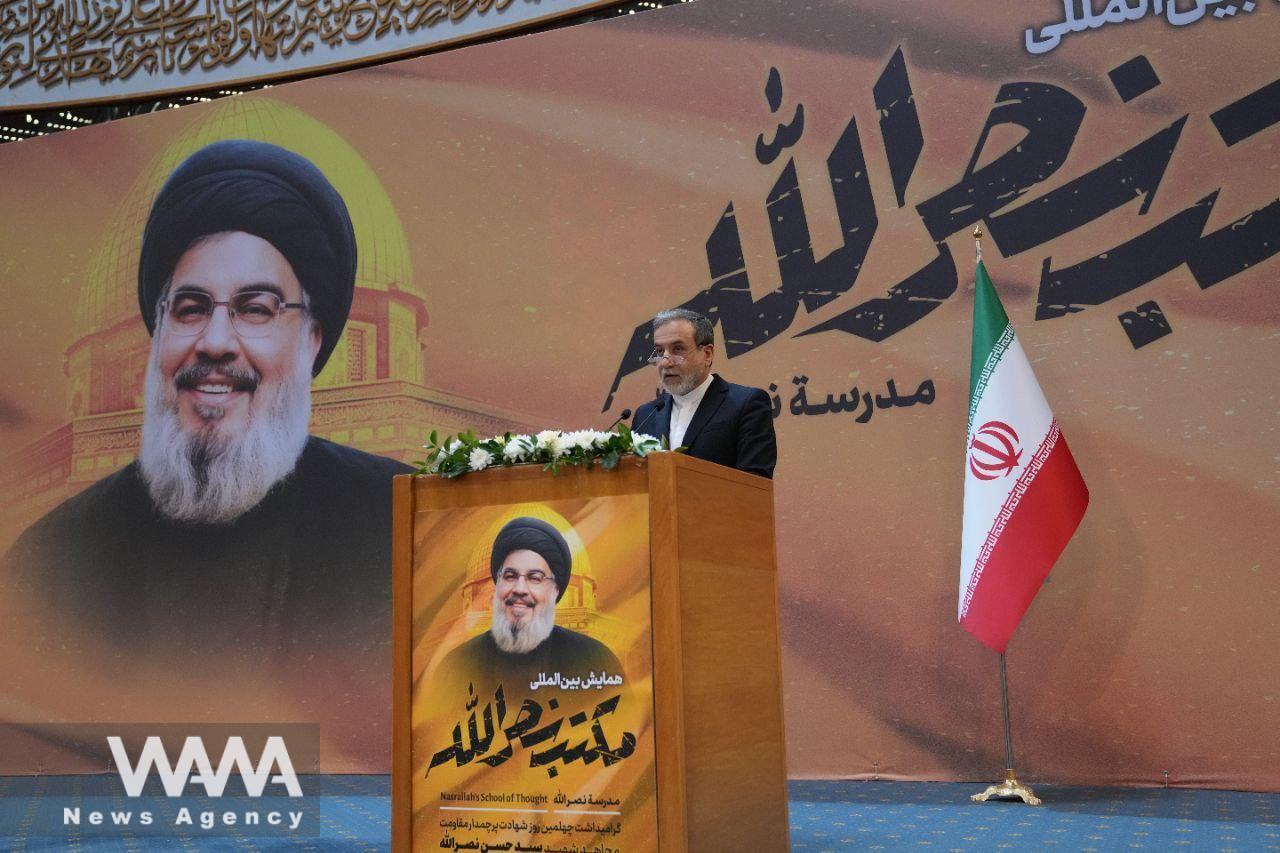Qalibaf: Hezbollah is a Force for Peace and Stability
WANA (Nov 09) – This morning, an international conference titled “Maktab Nasrallah,” dubbed in English “The School of Nasrallah,” was held in Tehran to commemorate the 40th day of the passing of Seyed Hassan Nasrallah, with the presence of Iranian and foreign officials.
Mohammad Bagher Qalibaf, Speaker of the Iranian Parliament Speeches
In his speech, Qalibaf highlighted the significance of Seyed Hassan Nasrallah’s martyrdom on the resistance front, emphasizing that it does not represent a defeat for the resistance. Instead, it removes the mask from the killers and criminals of the Israeli regime and exposes the deceitful nature of those who collaborate with this “evil regime.”
Referring to Imam Musa Sadr’s teaching, who described Israel as “absolute evil,” Qalibaf reminded that Nasrallah, from the beginning of the “Al-Aqsa Storm,” believed in a just struggle against Israel, considering it a religious and humanitarian battle.
Qalibaf emphasized Nasrallah’s wisdom and rational leadership, noting that “he turned Hezbollah into a strategic and ideological power that served not only Lebanon but also the security and progress of the region.”
He added that Hezbollah, under Nasrallah’s leadership, remained committed to its founding goals—fighting oppression and supporting the oppressed, which was not only Islamic but also a humanitarian cause.
Qalibaf also noted that Nasrallah transformed Hezbollah from a military entity into a social organization, symbolizing unity in the Islamic world, especially regarding Palestine. He described Nasrallah as one of the greatest media figures of the resistance, advancing the discourse of resistance on a global level.
Qalibaf referred to Israel’s repeated failures against Hezbollah, stating, “Despite the martyrdom of Hezbollah commanders and Israeli attacks, the regime could not penetrate Lebanese soil and instead witnessed Hezbollah’s extensive attacks on the occupied territories.” He pointed out that Israel’s attempt to assassinate Nasrallah failed, and they could not distort his true image.
Hezbollah is a force for peace and stability. If U.S. leaders truly wanted peace in West Asia, they should have controlled their ‘watchdog, he stated.
In conclusion, Qalibaf stressed the importance of continuing Hezbollah’s path under its new leadership and expressed hope for a future victory celebration in Jerusalem and the realization of the Palestinian people’s aspirations.
Ghalibaf, Speaker of Iran’s Parliament:
“The greatest humiliation for #Israel is that, despite assassinating Hezbollah leaders and commanders 40 days ago, it has been unable to advance into Lebanese territory.#Hezbollah is a force for peace and stability. If U.S. leaders… pic.twitter.com/9UeFURrBQo
— WANA News Agency (@WANAIran) November 9, 2024
Mohammad Javad Zarif, Iran’s Vice President for Strategic Affairs Speeches
Zarif, in his speech, emphasized that the path of the martyrs of the resistance, including Seyed Hassan Nasrallah, is the correct way to resist occupation and urged that this path should not be misrepresented. He stated, “Martyrs of the resistance died for the main goal—resisting occupation, not on behalf of others.”
Zarif noted that Hezbollah, Hamas, and Islamic Jihad are the results of Israeli occupation. “The people of Lebanon and Palestine did not lose to occupation, but stood up to it,” he said and stressed that Israel will never have peace until the occupation ends and Palestinian rights are acknowledged.
Zarif further stated that resistance should not be wrongly attributed to others. While Iran has stood alongside Palestine and Lebanon, the true cause is Palestine, and “everyone rose for the cause of Palestine, not on behalf of anyone else.”
He warned that if the U.S. and the West continue this strategic and tactical mistake, peace will never be achieved in the region. Zarif added that if a democratic and peaceful solution is sought, the path outlined by the Supreme Leader of the Islamic Revolution is clear: a referendum where all Palestinians and residents of the region—Muslim, Christian, and Jewish—can determine their future. “The end of apartheid in South Africa is a clear example that can and must be repeated,” he said.
He concluded, “This is the message of the blood of Seyed Hassan Nasrallah, Qasem Soleimani, Ismail Haniyeh, Yahya Sinwar, and other great martyrs of resistance and sacrifice; this path is invincible.”
Seyed Abbas Araghchi, Iranian Foreign Minister Speeches
Araghchi praised Seyed Hassan Nasrallah as a symbol of resistance, courage, and defiance against oppression and aggression. He noted that Nasrallah could shift the regional equations and change the course of events.
Araghchi highlighted Nasrallah’s belief in diplomacy, stating that the victory in Palestine and Lebanon required a simultaneous approach of resistance, active diplomacy, and multilateral cooperation.
He noted that Nasrallah and resistance also believed in dialogue and diplomatic engagement for sustainable peace and security, emphasizing the importance of just solutions and cooperation with countries and international organizations.
Araghchi reaffirmed that the Islamic Republic of Iran has always stood by the oppressed nations of the region and will continue to support them, particularly Lebanon and Gaza. He reiterated Iran’s unwavering support for the legitimate right of resistance against occupation and aggression.
Regarding Israel, Araghchi pointed out that if the war spreads, its consequences will not be confined to the Middle East but will affect distant regions as well. He emphasized that the path of resistance would continue, and Iran, inspired by great martyrs such as Seyed Hassan Nasrallah, would continue supporting the resistance and oppressed nations. “The blood of martyrs ensures our success and leads us to a brighter and more just future,” Araghchi concluded. “The main weapon of resistance is not missiles or drones, but the blood of martyrs.”

“Maktab Nasrallah,” conference, November 09, 2024. Social media/ WANA News Agency












